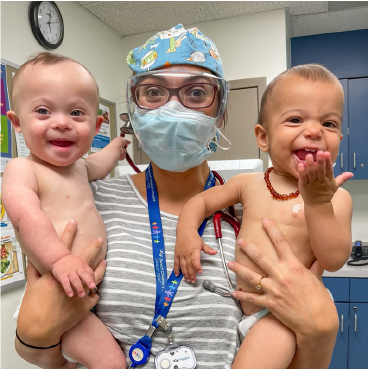Medical Outreach Alliance
The DSCBA offers information and resources to help you provide the best care possible for your patients with Down syndrome and for your new or expectant families.
We provide:
- Presentations (via Zoom or, in person) for medical professionals and staff that includes:
- Current information about Down syndrome
- Supportive ways to deliver a diagnosis to a new family
- How to best support families receiving a new diagnosis
- Local and national resources for families
- Welcome baskets to families welcoming a new baby with Down syndrome.
- Some clinicians may also have questions about the specific implications of COVID-19 for people with Down syndrome.
- We have a dedicated section on the Resources tab of our website with links to resources about this topic.
Thank you for taking time to research options that will help you provide individuals with Down syndrome and their families the information, resources, and support they need.
If you are interested in scheduling a presentation like this one, receiving medical outreach materials, or if you have additional questions, please contact our Medical Outreach Alliance, at MedicalOutreach@dscba.org or (925) 362-8660.
Welcome Basket Program
We have a welcome basket program for new families. We deliver a basket full of fun gifts for baby, such as baby books and handmade quilts and hats, as well as further information about Down syndrome that will assist parents as they begin their journey with their new baby.
Resources
-
Lettercase.org - "Understanding a Down Syndrome Diagnosis” is available for free as a web app and copies are available here. Medical providers can receive one free copy or contact MedicalOutreach@dscba.org to arrange a copy.
-
Free on-line training module for medical professionals.
-
National Down Syndrome Adoption Network - The National Down Syndrome Adoption Network was created to offer hope to expectant and birth parents who felt they would not be able to parent their child, and wanted a loving alternative – adoption. Review their booklet here, "A Loving Choice...Adoption as an Option".
- For Medical and genetics professionals, genetic counseling program directors, and students:
- For Medical Professionals and Medical Students:
- For Medical Professionals and Medical Students:
- For Prenatal and Pediatric Genetic Counselors - CEU's available
A Diagnosis Can Go Well
The Down Syndrome Diagnosis Network has put together a video with recent diagnosis experiences from families and medical providers about how a Down syndrome diagnosis CAN go well.
Down Syndrome Research and Clinical Trials
Why is Research for People with Down Syndrome Important?
Down syndrome is a known quantity – it is when a person is born with three copies of chromosome 21 instead of the usual two, called triplication. Therefore, scientists can better develop methods to understand how the triplication leads to a higher incidence of certain diseases and protects those same individuals from other diseases. This should also allow scientists to discover the mechanism leading to cognitive delay.
Such research is important for people with Down syndrome for many different reasons.
A registry is a collection of data about individuals with similar characteristics—in this case, individuals with Down syndrome. By filling out a profile and contributing information, individuals help complete the picture of the community. In return, registration typically offers access to information about new treatments and trials and education about Down syndrome, and may even provide access to local and regional resources.
You can help advance Down syndrome research.
If you are interested in participating in research or becoming part of a registry, the links below offer many options as well as resources.
- Presentation From Down Syndrome Research and Treatment Foundation, November 2nd, 2013, Cognition Research Update – Sarah Wernikoff, DSTRF Board Chair
- Developing Therapies to Improve Cognitive Abilities of Individuals With Down Syndrome – Dr. Craig Garner and Dr. Craig Heller: Part 1 & Part 2
- Presentation on Therapeutic Strategies for Cognitive Dysfunction in People with Down Syndrome – Almad Salehi, M.D., Ph.D
- "Understanding Research and Findings Associated with Learning and Memory" by Dr. Craig Heller, May 31, 2017 at Down Syndrome Connection of the Bay Area (PDF of slides)
- DSC2U – Down Syndrome Clinic to You
- Personalized health and wellness information for families with a loved one with Down syndrome.
- Click here to download a presentation about DSC2U
-
New NIH Grant-Funded Study: ASD Screening Tools in Down Syndrome - We are looking for caregivers of children with Down syndrome ages 6-18 to participate in an online research study about how to customize autism screening tools for children with Down syndrome. Your child does not need to have autism. Participation involves completing initial questionnaires about your child’s development (2-3 hours) and a few follow-up questions two weeks later (30 minutes). You can complete these at your own pace across multiple sessions. A family resource sheet and compensation are provided. For more information, please contact Dr. Channell’s team at idclResearch@illinois.edu or 217-265-6058.






 Contact Us!
Contact Us!

